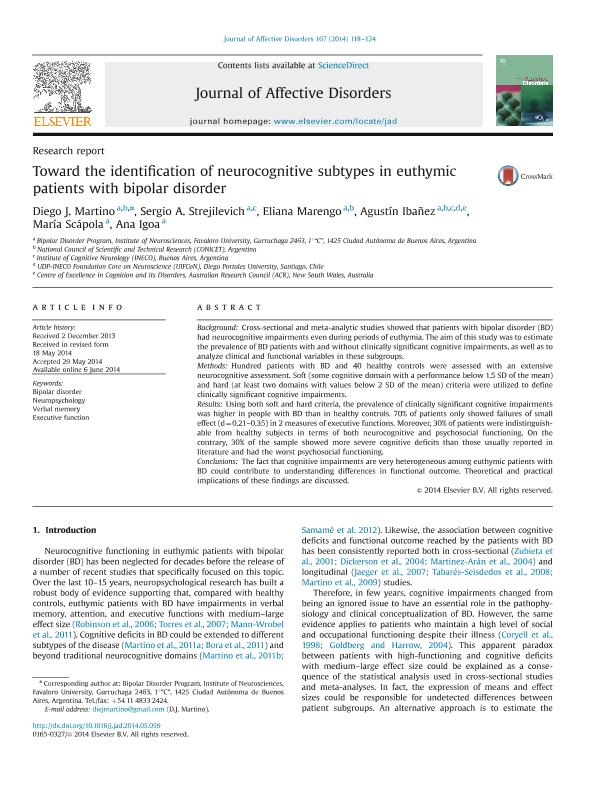Mostrar el registro sencillo del ítem
dc.contributor.author
Martino, Diego Javier

dc.contributor.author
Strejilevich, Sergio

dc.contributor.author
Marengo, Eliana

dc.contributor.author
Ibañez, Agustin Mariano

dc.contributor.author
Scápola, María
dc.contributor.author
Igoa, Ana
dc.date.available
2018-01-09T21:21:26Z
dc.date.issued
2014-06
dc.identifier.citation
Igoa, Ana; Scápola, María; Ibáñez Barassi, Agustín Mariano; Strejilevich, Sergio; Martino, Diego Javier; Marengo, Eliana; et al.; Toward the identification of neurocognitive subtypes in euthymic patients with bipolar disorder; Elsevier; Journal of Affective Disorders; 167; 6-2014; 118-124
dc.identifier.issn
0165-0327
dc.identifier.uri
http://hdl.handle.net/11336/32758
dc.description.abstract
Background: Cross-sectional and meta-analytic studies showed that patients with bipolar disorder (BD) had neurocognitive impairments even during periods of euthymia. The aim of this study was to estimate the prevalence of BD patients with and without clinically significant cognitive impairments, as well as to analyze clinical and functional variables in these subgroups.
Methods: Hundred patients with BD and 40 healthy controls were assessed with an extensive neurocognitive assessment. Soft (some cognitive domain with a performance below 1.5 SD of the mean) and hard (at least two domains with values below 2 SD of the mean) criteria were utilized to define clinically significant cognitive impairments.
Results: Using both soft and hard criteria, the prevalence of clinically significant cognitive impairments was higher in people with BD than in healthy controls. 70% of patients only showed failures of small effect (d=0.21–0.35) in 2 measures of executive functions. Moreover, 30% of patients were indistinguishable from healthy subjects in terms of both neurocognitive and psychosocial functioning. On the contrary, 30% of the sample showed more severe cognitive deficits than those usually reported in literature and had the worst psychosocial functioning.
Conclusions: The fact that cognitive impairments are very heterogeneous among euthymic patients with BD could contribute to understanding differences in functional outcome. Theoretical and practical implications of these findings are discussed.
dc.format
application/pdf
dc.language.iso
eng
dc.publisher
Elsevier

dc.rights
info:eu-repo/semantics/openAccess
dc.rights.uri
https://creativecommons.org/licenses/by-nc-sa/2.5/ar/
dc.subject
Bipolar Disorder
dc.subject
Neuropsychology
dc.subject
Verbal Memory
dc.subject
Executive Function
dc.subject.classification
Medicina Critica y de Emergencia

dc.subject.classification
Medicina Clínica

dc.subject.classification
CIENCIAS MÉDICAS Y DE LA SALUD

dc.title
Toward the identification of neurocognitive subtypes in euthymic patients with bipolar disorder
dc.type
info:eu-repo/semantics/article
dc.type
info:ar-repo/semantics/artículo
dc.type
info:eu-repo/semantics/publishedVersion
dc.date.updated
2018-01-08T19:49:16Z
dc.journal.volume
167
dc.journal.pagination
118-124
dc.journal.pais
Países Bajos

dc.journal.ciudad
Ámsterdam
dc.description.fil
Fil: Martino, Diego Javier. Universidad Favaloro. Facultad de Medicina. Instituto de Neurociencias. Programa de Trastornos Bipolares; Argentina. Consejo Nacional de Investigaciones Científicas y Técnicas; Argentina
dc.description.fil
Fil: Strejilevich, Sergio. Instituto de Neurología Cognitiva; Argentina. Universidad Favaloro. Facultad de Medicina. Instituto de Neurociencias. Programa de Trastornos Bipolares; Argentina
dc.description.fil
Fil: Marengo, Eliana. Consejo Nacional de Investigaciones Científicas y Técnicas; Argentina. Universidad Favaloro. Facultad de Medicina. Instituto de Neurociencias. Programa de Trastornos Bipolares; Argentina
dc.description.fil
Fil: Ibáñez Barassi, Agustín Mariano. Universidad Favaloro. Facultad de Medicina. Instituto de Neurociencias. Programa de Trastornos Bipolares; Argentina. Consejo Nacional de Investigaciones Científicas y Técnicas; Argentina. Instituto de Neurología Cognitiva; Argentina. Universidad Diego Portales; Chile
dc.description.fil
Fil: Scápola, María. Universidad Favaloro. Facultad de Medicina. Instituto de Neurociencias. Programa de Trastornos Bipolares; Argentina
dc.description.fil
Fil: Igoa, Ana. Universidad Favaloro. Facultad de Medicina. Instituto de Neurociencias. Programa de Trastornos Bipolares; Argentina
dc.journal.title
Journal of Affective Disorders

dc.relation.alternativeid
info:eu-repo/semantics/altIdentifier/url/http://www.sciencedirect.com/science/article/pii/S0165032714003541
dc.relation.alternativeid
info:eu-repo/semantics/altIdentifier/doi/http://dx.doi.org/10.1016/j.jad.2014.05.059
Archivos asociados
